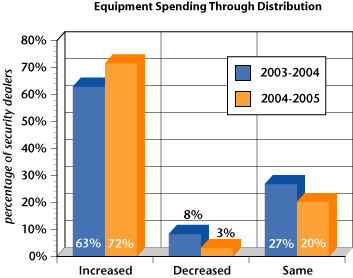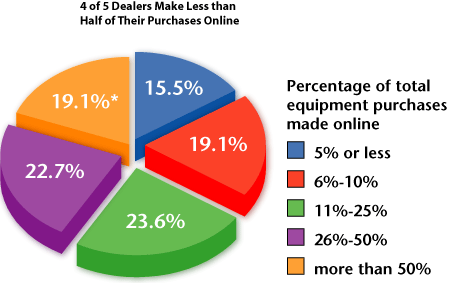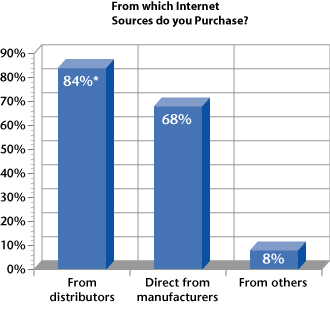Mike Romano, a manager with Audio Sentry, a security company based in Fraser, Mich., reports that his company has been buying more and more through distributors because distributors have expanded the variety of products that they offer.
“It used to be that they only had major parts, but now they want to sell us everything down to the smallest part,†he declares. “We used to stock everything all the time to better service our clients. Now we don’t need to stock as much. We’re finding more items more readily available and not nearly as many back orders.â€
Distributors also have added new services to make life easier for security dealers. For example, Romano notes that some distributors now will package orders into separate bundles based on the jobs for which they are intended. If one job needs six contacts and another needs 10, Audio Sentry will receive two separate boxes, each packed with the appropriate amount of devices and labeled with an identifier for an individual installation.
“We have added two outside support mechanisms for our customers,†explains Paul Swan, director of marketing for security equipment distributor Tri-Ed Distribution. “These include systems support specialists and business development managers in key areas of the country.
“These value-added positions bring new opportunities and services to the dealers’ doorsteps, like new product offerings, hands-on training, job walks and systems design, just to name a few,†Swan continues. “We will expand these groups substantially over the next several months.â€
Meanwhile, distributor ADI has begun to revamp its 100-plus outlets nationwide with the goal of making it easier for customers to locate and learn about products.
“We’re going to more of an open architecture design,†explains Herb Albinus, ADI senior merchandising planner. Instead of grouping products by manufacturer as in the past, merchandise instead will be displayed by product type.
“From the minute customers walk in, they can see all of the product categories,†Albinus emphasizes. “There is a red band that goes all around the branch with labels for the different categories and for the hospitality area or the training room.â€
ADI will move away from its current 30-foot long counters, Albinus notes. Instead, each location will include several sales pods, each measuring approximately four feet or five feet wide and three feet or four feet deep.
Each pod will be manned by an individual salesperson. This arrangement will enable customers to have more one-on-one conversations with salespeople and will add a level of privacy, which can be important when discussing bids or other confidential topics.
The renovated centers also will include informative displays and full-function, self-guided product demos. “If you’ve been doing burglary systems for 20 years and tomorrow you have to do fire, you can guide yourself to an area and make intelligent choices,†Albinus points out.
ADI already has renovated several branches and plans to complete approximately 20 this year. As an added convenience, the company also will be adding “will call†windows so that people who are just picking up merchandise do not have to wait in line behind people who may need to consult with salespeople on product decisions.

Internet ordering on the rise
Although security dealers increasingly are using the Internet to place equipment orders, most still rely primarily on more traditional purchasing methods. Slightly less than half of security dealers in the SDM survey (48 percent) say they purchase equipment over the Internet. But only 19 percent use it to place more than 50 percent of their equipment orders.When asked about the advantages of Internet purchasing, dealers commonly mentioned the ability to save time and to order products outside of regular business hours. Romano, for example, says that Audio Sentry employees often research the equipment for a job after normal business hours.
“Once we know what we want to use, we want to place the order right then and there, but it could be 7:30 or 8:00 in the evening,†Romano notes. That’s when the company turns to the Internet, using it to place orders with the company’s usual distributors.
Price also can be a factor in some dealers’ decisions to purchase through the Internet. A total of 44 percent of respondents to the SDM survey believe prices of security equipment sold over the Internet generally are less expensive in comparison with more traditional methods of purchasing. However, slightly more respondents (51 percent) thought prices of equipment purchased through the Internet were about the same.
Dealers’ perceptions about pricing through the Internet may be affected by the type of online merchandise they use. Traditional alarm equipment distributors typically charge the same whether customers purchase over the Internet, by phone or in person.
However, some new distributors have emerged with a focus primarily or solely on the Internet and may emphasize a lower-price, no-frills approach. But Swan of Tri-Ed believes dealers who try such offerings are often disappointed by the service that they get.
“More and more Internet offerings are affecting how dealers obtain certain products,†Swan maintains. “This is more noticeable in the CCTV arena. The Internet offerings come and go and don’t offer the value-added services that distribution offers such as design assistance, technical support, return facilities, etc.
“Quality issues will also hinder some of the Internet offerings,†he insists. “We see some dealers trying these services based on price alone, but eventually they migrate back to us.â€
When asked about the disadvantages of Internet purchasing, many dealers mentioned a lack of personal contact or buying assistance. “I like to talk to a person,†declares Dan Johnson, operations manager for SOS Alarm, Medford, Ore. Johnson also would have difficulty ordering over the Internet because he shares an Internet connection with other employees and because it would complicate his bookkeeping.
Currently, Johnson writes a purchase order, faxes it to the manufacturer or distributor, then passes it on to accounting. If he were to order over the Internet, he would have to complete several online entries and would still need to create a purchase order for internal accounting purposes, which requires duplicate effort.
A total of 84 percent of respondents to the SDM survey who buy equipment online say their Internet purchases are through distributors, which could include traditional and specialty distributors; 78 percent buy from manufacturers and 8 percent buy from other sources, including online auctions, overseas outlets, industry buying groups and retailers.
Alarm equipment on the shelves of home improvement stores and other retailers is becoming increasingly commonplace, but alarm dealers do not seem too upset about it. For example, Johnson points out that alarm equipment is available through a retailer in his area, but it has not created any problems for SOS.
Lowell Poteet, director for DSI Systems, Chickamauga, Ga., does not mind when a company such as Radio Shack sells alarm equipment to end-users because that organization helps make sure that equipment is professionally installed.

Unauthorized purchasers
A bigger concern may be a new one that is created by the ability to order over the Internet – the enterprising consumer who uses the Internet to learn what dealers pay for their equipment and who may even go so far as to order equipment at wholesale prices.Jeremy Zook, materials manager for A&E Security, McMinnville, Ore., says salespeople for his company often prefer to leave off part numbers when they give potential customers a quote on an installation.
Without a specific part number, it is more difficult for an end user to look up a price on the Internet. A&E also has received requests to install equipment from customers who already have obtained their own products.
“We’ve had people that have ordered equipment, had trouble installing it and want us to finish it,†Zook reports. “We’ve done a couple if they use equipment that we normally work on.â€
Audio Sentry also has received such requests, but always makes a point of turning them down. “I’m very apprehensive about that kind of job,†Romano explains. “I don’t know where the equipment came from, and I don’t want to be responsible for it.â€
Poteet is concerned that end users’ Internet equipment purchases could be a sort of time bomb. Over time, systems that have been poorly installed by end users are likely to malfunction, potentially giving the security industry a bad reputation.
“I’m not concerned about losing money,†Poteet asserts. “It’s more an issue of professionalism. It makes a good industry look bad.â€
Although end users buying their own equipment always have been a danger, Poteet believes it has become a bigger threat as Internet sales have increased. While many distributors and manufacturers require that a company be a licensed alarm dealer, such requirements can be more difficult to enforce over the Internet.
Poteet believes the alarm industry could do a better job of policing itself. He points to the heating, ventilation and air conditioning (HVAC) industry as a model of how to help prevent abuse by end users.
Unlike the alarm industry, industrial-grade HVAC equipment is not available through retailers but is only available through specialty distributors, Poteet maintains. He adds that HVAC distributors also do not sell through the Internet.
Alarm dealers can do their part to keep the industry more professional by supporting distributors that refer end users to dealers and by boycotting distributors that they find selling direct to end users, Poteet suggests. He also urges dealers not to sell any equipment to end users unless the dealer also handles the installation.

Sidebar: Purchasing Direct From Manufacturers
Despite the popularity of equipment distributors in the security industry, some security dealers still prefer to purchase most of their equipment directly from manufacturers. Two such companies are A&E Security, McMinnville, Ore., and SOS Alarm, Medford, Ore.“It’s nice working with people who know their equipment exclusively,†points out Dan Johnson, operations manager for SOS Alarm, which is 300 miles from the nearest distributor.
SOS buys the majority of its equipment direct from one manufacturer and generally uses distributors only for products that the manufacturer does not offer. Purchases through distribution comprise approximately 15 percent to 20 percent of total SOS purchases.
A&E is only about 30 minutes from a distributor, but it too prefers to purchase directly from the manufacturer as much as possible. “We use a distributor for items that we use occasionally,†explains Jeremy Zook, A&E materials manager.
Zook places about 10 percent to 15 percent of A&E’s orders with its primary manufacturer over the Internet but prefers to use the phone. “Our Internet ordering will increase once vendors get their Web sites better figured out,†Zook insists.

